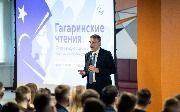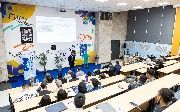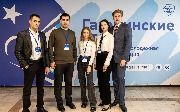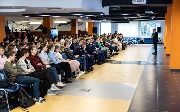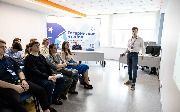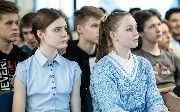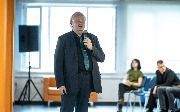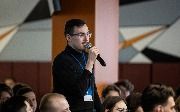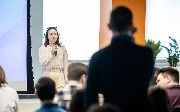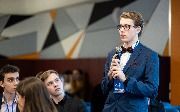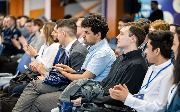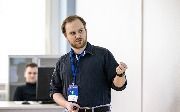Russian orbital station and the prospects of unmanned flights: anniversary “Gagarin Readings” opened in MAI
On April 9, the 50th International Youth Scientific Conference "Gagarin Readings" opened in Moscow Aviation Institute. This year representatives of 12 countries, including India, China, Colombia, Egypt, Turkey, and 77 cities in Russia, participated in it.
The conference organizers received almost 1,100 applications from 1,450 authors in total.
At the opening ceremony, Yury Ravikovich, MAI Vice-Rector for Scientific Work, addressed the participants with a welcoming speech. He congratulated the young scientists on the start of the 50th anniversary conference. For many of them, the current Gagarin Readings are the first experience of public speaking with a scientific report and an important step for their future careers.
Yury Alexandrovich spoke about MAI participation in the programs “Priority 2030”, “Advanced Engineering Schools”, the Consortium of Aerospace Universities of Russia, whose president is MAI Rector Mikhail Pogosyan. The University is actively increasing the volume of research works in the interests of industrial partners: in 2023, their total amount increased to more than 2 billion rubles, in 2024 it will approach 3 billion.
During the plenary session, the conference participants listened to two reports. The first speaker was the Deputy General Designer, Chief Designer of the Russian Orbital Station of JSC “Energia” Vladimir Kozhevnikov. He spoke about Russian Orbital Station as a new testing ground in space.
At the end of March, Roscosmos approved the preliminary design of the station, which is scheduled to enter orbit in 2027-2032. The station will have open modular architecture: modules can be replaced as they wear out. Another important feature of the new station is the polar orbit, which will provide an overview of the entire earth's surface, including the Northern Sea Route, which is of strategic importance to the country. This is not possible from the ISS orbit.
One of the significant advantages of ROS is its higher electrical power, if compared to the Russian segment of the ISS, which will allow testing demanded technologies and equipment at the station, such as radars and antennas of high-power systems.
Moscow Aviation Institute is also involved in the creation of ROS in cooperation with RSC “Energia”.
– Working groups were created in MAI in the interests of RSC “Energia”. Now they are actively engaged in the development of ergonomic support for the future station using virtual reality, equipment for extravehicular activity, digital modeling – the creation of digital twins, – Kozhevnikov noted.
The second report was presented by Evgenia Chigarkova, Deputy Head of the Department for training and certification of specialists in the operation of unmanned aircraft systems of LLC “BAS”. “BAS” is the first airline in Russia to receive a certificate for the use of unmanned aircraft systems.
The expert spoke about the development of unmanned aerial system applications and personnel training for this industry: secondary vocational education programs, retraining programs, the Archipelago-2024 design and educational intensive course, which are being implemented as part of the federal project "Personnel for Unmanned Aircraft Systems".
– Our airline has the certificate of the operator, which allows us to perform aviation work. At the same time, we are also currently creating our own training center. Its task will be to train personnel for the industry using innovative teaching methods: new digital technologies, robotics. We will be glad if you want to offer our company new digital technologies for UAV operation training, – she said, addressing the conference participants.
The Gagarin Readings will end on April 12. The scientific program will include meetings of thematic sections in 10 areas: “Aviation systems”, “Aviation, rocket engines and power plants”, “Control systems, informatics and electric power industry”, “Information and telecommunication technologies of aviation and rocket and space systems”, “Economics and management of enterprises of the aerospace complex”, “Rocket and Space Systems”, “Robotics, intelligent systems and aviation armament”, “Mathematical methods in aerospace science and technology”, “New materials and production technologies in the field of aviation and rocket and space technology”, international session.
See the detailed program on the official website gagarin.mai.ru.
The results of the work of the conference sections will be published in the MAI telegram channel.
